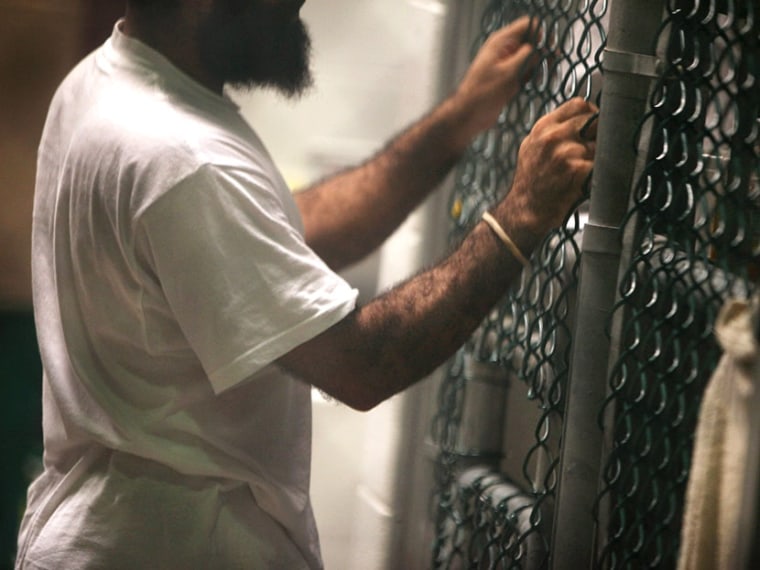Since President Obama signed an executive order to close Guantanamo Bay prison on his second day in office, the process of shutting down the facility in which dozens of men have been held without charges or prospects for trial since 2001 has ground to a halt. There were few answers to the question of how to end what Vermont Democrat Senator Patrick Leahy called the prison's "long-failed experiment" of indefinite detention at a Senate subcommittee hearing Wednesday—the first hearing held to address the issue in five years.
The hearing laid bare the deep divide between those who support transferring the 86 detainees who have been cleared of any wrongdoing by a task force, and those who believe that closing the 11-year-old facility would be a capitulation to al-Qaeda and its supporters.
At the heart of the ongoing debate over what to do about the prison is where to hold prisoners who have been deemed by the Obama administration as too dangerous to release, but who cannot be tried because evidence against them obtained through torture is inadmissible.
“Every day Guantanamo remains open, we are wasting taxpayer dollars," said Democratic Senator Dick Durbin of Illinois, the chair of the subcommittee that held the hearing. Durbin noted that it costs $2.7 million per detainee each year, nearly 35 times what the U.S. spends on prisoners at the supermax in Colorado that holds the nation's most dangerous inmates. He called the continued expense “irresponsible during ordinary economic times,” and said it is “even worse during sequestration.”
In February, detainees began a hunger strike to protest conditions at the prison; it swelled to 106 men at the strike's peak. Of those detainees, 69 remain on strike, with 45 of them being force-fed through nasal tubes. Ret. Brigadier General Stephen Xenakis, a psychiatrist who has met with detainees, testified Wednesday that the policy of force-feeding "compromises the core values of our profession and "violates medical ethics and international legal standards."
Despite testimony from retired general Paul Eaton that the U.S. is up to the task of managing the risk of recidivism for some detainees, the mere possibility that detainees could engage in terrorist activities after being released was reason enough for members of Congress to support keeping Guantanamo open and continuing to hold men there.
Both Sen. Ted Cruz, the Texas Republican, and Republican Rep. Mike Pompeo of Kansas argued that closing the prison would embolden terrorists and create risks to Americans if they were housed in U.S. prisons. Pompeo and Cruz also both made appeals to human rights concerns as reasons for keeping men at the facility in Cuba; Pompeo argued that detainees could be tortured by the countries that take them in, while Cruz suggested that America's use of drones to kill suspected terrorists is less humane than holding men without charge or trial until they die.
While there are risks to closing the prison, delaying action could have even more dire consequences.
“If President Obama bequeaths Guantanamo to his successor, it could lay the groundwork for a future administration to establish a permanent indefinite detention facility with an alternative system of justice for terrorism suspects that would be less effective and less credible to the rest of the world," testified Elissa Massimino, CEO of Human Rights First. Massimino's group laid out a course of action for the administration in a white paper it released Wednesday.
President Obama has the authority under the National Defense Authorization Act to bypass Congress and authorize Defense Secretary Chuck Hagel to issue national security waivers to transfer detainees to third party nations, but he has not yet used that power. Congress has also strongly opposed any attempt to shutter the prison and transfer detainees to U.S. prisons, despite the fact that hundreds of individuals have been tried and convicted of terrorism-related charges in U.S. civilian courts.
Massimino told msnbc before the hearing that the recent appointment of Clifford Sloan to head State Department efforts to transfer prisoners, an impending appointment to a corresponding office at the Pentagon, and news that long-delayed Periodic Review Board hearings will be held, all suggest that concrete progress is closer than ever.
“As far as problems go, closing Guantanamo should not be one of the more complex,” she said.
No dates have yet been set for any PRB hearings.
Obama must work quickly to harness the momentum that has built in the wake of the hunger strike and Congressional engagement if he wants to close Guantanamo, Massimino said.
“I think that the linchpin of any strategy that has a chance of success is presidential leadership,” she said. “The courts, the military, our law enforcement are all up to the task” of releasing detainees and managing the potential risks that some might pose. “We need to have faith in our institutions, our judgment, and our values.”
